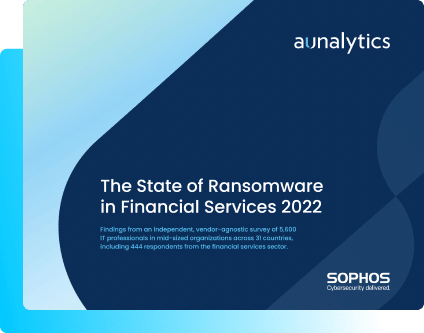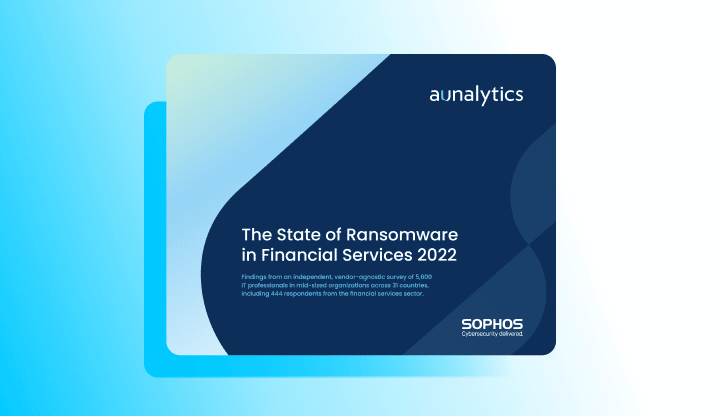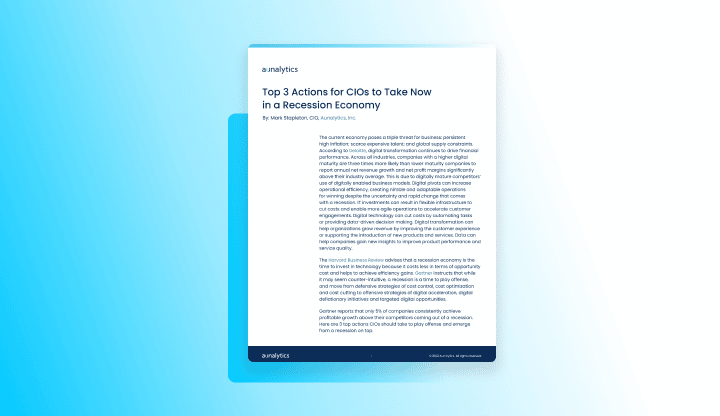5th Annual BankTech Conference
5th Annual BankTech Conference
Chicago Marriott Southwest, Burr Ridge, IL
Aunalytics to Present at the 5th Annual BankTech Conference and Participate at the Innovators' Showcase
Aunalytics is proud to participate in the 2022 BankTech Conference on October 6, 2022 in Burr Ridge, IL. Rob Bradford, Security Operations Manager at Aunalytics, will be presenting the talk, “The Cost of Skimping on Security in 2022” at 10:15am central time. Representatives from Aunalytics will also be showcasing our Secure Managed Services IT offering as well as our Advanced Security solution during the Innovators’ Showcase.

2022 Indiana Bankers Association Security & Tech Conference
2022 Indiana Bankers Association Security & Tech Conference
Renaissance Indianapolis North Hotel, Carmel, IN
Aunalytics is Proud to Attend the 2022 IBA Security & Technology Conference
Aunalytics is proud to participate in the 2022 Indiana Bankers Association Security & Technology Conference from October 4-6, 2022 in Carmel, IN. Representatives from Aunalytics will be showcasing our Secure Managed Services IT offering as well as our Advanced Security solution.

Aunalytics Launches Security Patching Platform as a Service
Expedited Software Patching and Updating Recognized as One of the Most Important Processes to Protect Against System Compromise from Cyberattacks
South Bend, IN (September 27, 2022) – Aunalytics, a leading data management and analytics company delivering managed IT and data platform services for mid-sized and enterprise businesses, today initiated its Security Patching Platform, Co-managed Patching as a Service to complement the company’s Advanced Security solution suite. Windows OS and supported 3rd party patch management allow for tighter security in the defense against cyberattacks and the new offering ensures active remediation.
According to a 2022 Data Breach Investigations Report by Verizon, around 70 percent of successful cyberattacks exploited known vulnerabilities with available patches, making it important to update operating systems and applications regularly to prevent such attacks. Now, Aunalytics’ new technology as a service includes the tools, structure, strategy and intelligence for managing patch deployment and is a complete solution with best practices, templates, libraries, and built-in alert thresholds.
Lack of security patching leads to vulnerabilities within an organization’s information systems, internal controls, or system processes, which can then be exploited by cybercriminals. Using a collection of tools, cyber attackers use the vulnerability to gain unauthorized access to corporate systems and data. Identifying and resolving vulnerabilities is very important since a successful exploit can lead to a full-scale system breach.
Workstation and server application patching ensures that organizations have baseline protection against the latest security vulnerabilities, preventing such attacks before they occur. However, patching can be difficult to manage and update in real-time as software fixes are published on an ongoing basis. Setting up and coordinating manual patching across an organization can be extremely cumbersome, taking days to organize, schedule, and execute across an entire company.
McKinsey cites good patch management as a top proactive maintenance measure that can help organizations prevent cyberattacks. However, knowing the priority level for patch installment can be confusing and lead to poor patch management as a result. Enlisting the help of a partner to employ security patching best-practices can add true value to many organizations. Aunalytics patch detection, download, and installment methods are developed considering each client’s security and uptime requirements and prioritized in order of threat potential. Aunalytics’ experienced security patching team proactively monitors for updates, eliminating worry for end users and server administrators.
As part of the new service, users gain access to comprehensive security solutions with customized alerting and vulnerability prioritization, leveraging proprietary solutions and processes. The platform facilitates collaboration between IT and security teams and includes the following capabilities:
- Inventory and performance management and proactive alerting
- Patch deployment control strategy, prioritization, planning
- Patch vetting and blacklisting intelligence
- Windows Operating System patch management
- Supported 3rd Party Patch Management
- Anti-Malware
- DNS-based Malware Protection
- Device Encryption Management
- Innovative management tool library
“Security patch exploits can have extremely damaging effects on an organization, decreasing revenues or causing reputational damage, making it imperative to have security patching in place,” said Chris Nicholson, Vice President of Managed IT Services. “Aunalytics’ Security Patching Platform services allow for the rapid resolution of these concerns to maintain the highest levels of cyber-resiliency.”
About Aunalytics
Aunalytics is a leading data management and analytics company delivering Insights-as-a-Service for mid-sized businesses and enterprises. Selected for the prestigious Inc. 5000 list for two consecutive years as one of the nation’s fastest growing companies, Aunalytics offers managed IT services and managed analytics services, private cloud services, and a private cloud-native data platform for data management and analytics. The platform is built for universal data access, advanced analytics and AI — unifying distributed data silos into a single source of truth for highly accurate, actionable business information. Its DaybreakTM industry intelligent data mart combined with the power of the Aunalytics data platform provides industry-specific data models with built-in queries and AI for accurate mission-critical insights. To solve the talent gap that so many mid-sized businesses and enterprises located in secondary markets face, through its side-by-side digital transformation model, Aunalytics provides the technical talent needed for data management and analytics success in addition to its innovative technologies and tools. To learn more contact us at +1 855-799-DATA or visit Aunalytics at https://www.aunalytics.com or on Twitter and LinkedIn.
PR Contact:
Denise Nelson
The Ventana Group for Aunalytics
(925) 858-5198
dnelson@theventanagroup.com
Don't Let Your Data Work Against You—Your Organization Needs a Single Source of Truth
As the business landscape continues to evolve and become more data-driven every day, organizations need to go through an intense digital transformation to remain competitive. The need to leverage data to maximize business opportunities and revenue is evident. While at one time technologies were built solely for enterprises, now most mid-sized businesses are beginning to invest in data analytics solutions. But before successfully deploying an analytics solution, there might be a major organizational problem to deal with—your dirty data might be getting in the way of getting accurate analytics. What you need is a single source of truth.
Gain a Complete, Accurate Picture of Customers
Let’s pretend you have a client named Emily Miller. Your marketing department has Emily logged in their CRM, while the sales team has their information in a spreadsheet that they update daily. The service department logs their tickets and complaints in their own solution, while accounting has Emily’s invoices in yet another system. We’re talking about one person, but there are multiple versions of Emily’s data across your organization, siloed in different departments. While we know Emily’s name, her interactions with your organization and all the data related to her is scattered across your organization. Departments have partial information that is specific to Emily, but it might be inconsistent business unit to business unit. This means that no one can see the complete picture of who this customer is to your company.

If analytics is based upon data from one business unit, it will undoubtedly result in inaccurate or incomplete insights. If you switch analytics to be based upon a different data source or aggregate multiple data sources with conflicting information, you still get inaccurate analytical results. Basing your organization’s analytics only on a part of a client’s data has a negative impact on your organization’s goals. A single source of truth ensures you have a full, 360-degree picture of your clients and leads to dependable, daily analytics you can trust.
Utilize a Solution That Ensures Data Accuracy
An analytics platform such as Daybreak with built-in data integration and cleansing, or a data accuracy solution such as Aunsight Golden Record enables your organization to integrate and wrangle siloed data from disparate sources to a cleaned and accurate single source of truth. Matching and merging dirty data into a single source of information will result in you receiving consistent, accurate data from across your organization. With clean, accurate data for your reporting you can be prepared for better decision-making, allowing you to progress towards your business goals faster than ever before.
If your departments are using different data sources, using that information for client analytics is counterproductive. This situation is akin to your hands working separately from each other and adversely affecting your end goals. You need to bring your company-wide data together and combine it into a single source of truth. Having clean information with input from all your departments going into a single analytics solution sets you up for actionable insights that work along with you—not against you.
Unlocking the Value of Data Analytics: What Mid-Market Companies Need to Understand
Unlocking the Value of Data Analytics: What Mid-Market Companies Need to Understand
 Most mid-market companies make one mistake or another when investing in a data analytics platform, not understanding the many intricacies associated with preparing their data to get the best results. Some of the most common mistakes include:
Most mid-market companies make one mistake or another when investing in a data analytics platform, not understanding the many intricacies associated with preparing their data to get the best results. Some of the most common mistakes include:
- Not realizing they need to build pipelines to get the data from their multiple data sources to the analytics platform
- Tasking IT with implementing a data analytics solution, when the IT department does not have data science skillsets
- Basing analytics on data that is riddled with errors, incomplete, or stale, which compromises quality of decision-making due to the inaccuracy and tardiness of the underlying data.
- Relying on the reporting function of one data source and not taking into account data beyond that source for decision-making
- Using dashboards that provide insights into the past only, and not the future – a gap that needs to be bridged to compete with larger enterprises

To read more, please fill out the form below:
Learn More
Unlocking the Value of Data Analytics: What Mid-Market Companies Need to Understand
Unlocking the Value of Data Analytics: What Mid-Market Companies Need to Understand
 Most mid-market companies make one mistake or another when investing in a data analytics platform, not understanding the many intricacies associated with preparing their data to get the best results. Some of the most common mistakes include:
Most mid-market companies make one mistake or another when investing in a data analytics platform, not understanding the many intricacies associated with preparing their data to get the best results. Some of the most common mistakes include:
- Not realizing they need to build pipelines to get the data from their multiple data sources to the analytics platform
- Tasking IT with implementing a data analytics solution, when the IT department does not have data science skillsets
- Basing analytics on data that is riddled with errors, incomplete, or stale, which compromises quality of decision-making due to the inaccuracy and tardiness of the underlying data.
- Relying on the reporting function of one data source and not taking into account data beyond that source for decision-making
- Using dashboards that provide insights into the past only, and not the future – a gap that needs to be bridged to compete with larger enterprises
It should also be noted that analytics requires massive storage and compute to mine data for actionable insights. Even in a cloud environment, which is less costly to maintain than on-premise servers, data analytics takes up a huge amount of compute to mine transactional data for AI-driven insights. Most data warehouses used by mid-market companies are not built for analytics, and their contracts with public cloud vendors for data storage often incur huge overage charges for compute spikes as millions of calculations are being completed for algorithms to converge for analytics results. Data analytics needs a cloud built for analytics. The mid-market should demand a built-in analytics cloud from an analytics solution, without a third-party public cloud contract to make it work (or attempt to host it in their regular institution data storage).
Industry Knowledge is Key
One of the most important aspects to understand is that there is no one-size-fits-all when it comes to data analytics. The value lies in industry specific data models, which must be built with algorithms using salient data points for a specific industry and appropriately weighted for that industry. For example, to build customer revenue in financial services, mining transactional banking data is important to reveal if a customer is doing business with competing financial institutions so that action can be taken to win this business over. In manufacturing, comparing product inventory at various channels and channel or retail sales locations is important for discerning sales performance and growth opportunities. In healthcare, mining insurance reimbursement claims for underpayments to recapture lost revenue requires comparisons of contracted amounts and fee schedules for multiple private insurance companies, plan coverages, and more. The true business value of analytics lies in industry specific data models and the data enrichment made possible by deep learning and the generation of actionable insights.
The Importance of Having the Right Expertise
This brings us to the requirement for data scientists and business analysts, which assist with achieving powerful and current actionable insights that lead to AI-driven decision-making and better business outcomes. Data scientists build algorithms to detect trends, patterns and predictions based upon the data, to position an enterprise for the future. Business analysts are industry specific and connect the dots between the data points relevant for answering business questions in that particular industry. They also help to design dashboards and other data visualizations to ensure that the insights generated answer questions important to that industry using industry-specific terminology, and analyze analytics results in the context of industry knowledge to reveal growth drivers and other opportunities for driving revenue. Typical IT departments do not have these skill sets.
Data Analytics Platform Requirements
Consider these questions when evaluating a data analytics platform:
- Which data sources are forming the basis for the insights: Is the analysis based upon only some of the data, leaving out important data sources? Do the analytics use the most important data points? Is too much data or the wrong data being used?
- How is the data cleansed for accuracy: To judge the accuracy of the insights, know what is being done to eliminate errors in the underlying data being analyzed. Garbage in leads to exponential garbage out when data is turned over to AI. Can the data be trusted?
- Which algorithms are being used to find insights: Is it a specialized or generic deep learning model? Is it optimized for the type of inquiry or result being sought? Is it tailored to a specific industry and weighted appropriately for that industry and the question posed? Can the results be trusted?
- Are the analytics results providing actionable insights such as how to grow revenue, improve efficiency or achieve other business outcomes? Are the results tied to solving business challenges, and not just AI for the sake of being cool?
Side-by-Side Approach
 Most mid-market companies are not in the business of IT or data science. IT is a necessary administrative function for operating a business, but should not become the main focus of most non-tech mid-market companies. However, given the expertise needed to use and maintain most analytics solutions, and the cost of data expert professionals as FTEs, the cost of data management and analytics can quickly overtake mainline business COGS expenses. Given all the complexities and challenges associated with unlocking the true value of data analytics, a new approach is needed that mid-market businesses can afford, enabling them to leverage AI-driven analytics and more effectively compete.
Most mid-market companies are not in the business of IT or data science. IT is a necessary administrative function for operating a business, but should not become the main focus of most non-tech mid-market companies. However, given the expertise needed to use and maintain most analytics solutions, and the cost of data expert professionals as FTEs, the cost of data management and analytics can quickly overtake mainline business COGS expenses. Given all the complexities and challenges associated with unlocking the true value of data analytics, a new approach is needed that mid-market businesses can afford, enabling them to leverage AI-driven analytics and more effectively compete.
A side-by-side service model offers an alternative that goes beyond most tools and platforms on the market by providing a data platform with built-in data management and analytics, as well as access to human intelligence in data engineering, machine learning, and business analytics. Ideally it should operate as a cloud-based platform with a subscription service that places the burden of the data engineering expertise, technical tooling, and building and maintaining the infrastructure on the data management provider.
While many companies offer tools, and many consulting firms can provide guidance in choosing and implementing the tools, integration of all the tools and expertise in one end-to-end solution built for non-technical business users is key for digital transformation success for midmarket businesses.
The State of Ransomware in Financial Services 2022
The State of Ransomware in Financial Services 2022
This report examines ransomware trends across the financial services sector as revealed in a 2022 survey of 5,600 IT professionals. The survey was commissioned by Sophos, an Aunalytics partner, and leader in the cybersecurity space.

Fill out the form below to receive a link to the report.
Aunalytics is a data platform company. We deliver insights as a service to answer your most important IT and business questions.
Top 3 Actions for CIOs to Take Now in a Recession Economy - PDF
Top 3 Actions for CIOs to Take Now in a Recession Economy
The current economy poses a triple threat for business: persistent high inflation; scarce expensive talent; and global supply constraints. However, there are 3 actions CIOs should take to play offense to emerge from a recession on top.












